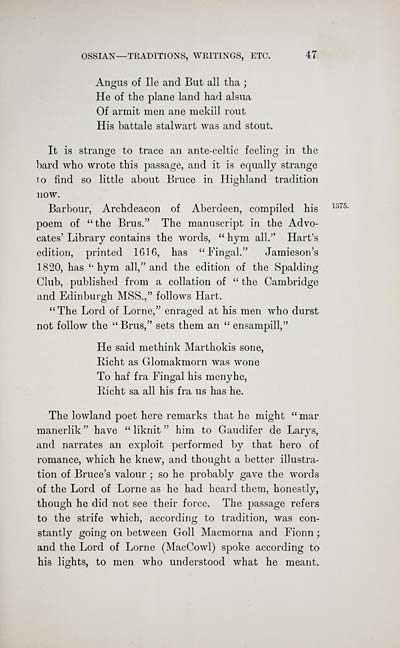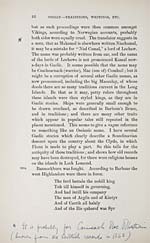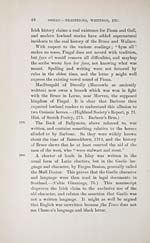Download files
Complete book:
Individual page:
Thumbnail gallery: Grid view | List view

OSSIAN— TRADITIONS, WRITINGS, ETC. 47
Angus of He and But all tha ;
He of the plane land had alsua
Of armit men ane mekill rout
His battale stalwart was and stout.
It is strange to trace an ante-celtic feeling in the
bard who wrote this passage, and it is equally strange
to find so little about Bruce in Highland tradition
now.
Barbour, Archdeacon of Aberdeen, compiled his
poem of "the Brus." The manuscript in the Advo-
cates' Library contains the words, " hym all." Hart's
edition, printed 1616, has "Fingal." Jamieson's
1820, has ''hym all," and the edition of the Spalding
Club, published from a collation of " the Cambridge
and Edinburgh MSS.," follows Hart.
"The Lord of Lome," enraged at his men who durst
not follow the "Brus," sets them an " ensampill,"
He said methink Marthokis sone,
Bicht as Glomakmorn was wone
To haf f ra Fingal his menyhe,
Bicht sa all his fra us has he.
The lowland poet here remarks that he might " mar
manerlik " have " liknit " him to Gaudifer de Larys,
and narrates an exploit performed by that hero of
romance, which he knew, and thought a better illustra-
tion of Bruce's valour ; so he probably gave the words
of the Lord of Lome as he had heard them, honestly,
though he did not see their force. The passage refers
to the strife which, according to tradition, was con-
stantly going on between Goll Macmorna and Fionn ;
and the Lord of Lome (MacCowl) spoke according to
his lights, to men who understood what he meant.
Angus of He and But all tha ;
He of the plane land had alsua
Of armit men ane mekill rout
His battale stalwart was and stout.
It is strange to trace an ante-celtic feeling in the
bard who wrote this passage, and it is equally strange
to find so little about Bruce in Highland tradition
now.
Barbour, Archdeacon of Aberdeen, compiled his
poem of "the Brus." The manuscript in the Advo-
cates' Library contains the words, " hym all." Hart's
edition, printed 1616, has "Fingal." Jamieson's
1820, has ''hym all," and the edition of the Spalding
Club, published from a collation of " the Cambridge
and Edinburgh MSS.," follows Hart.
"The Lord of Lome," enraged at his men who durst
not follow the "Brus," sets them an " ensampill,"
He said methink Marthokis sone,
Bicht as Glomakmorn was wone
To haf f ra Fingal his menyhe,
Bicht sa all his fra us has he.
The lowland poet here remarks that he might " mar
manerlik " have " liknit " him to Gaudifer de Larys,
and narrates an exploit performed by that hero of
romance, which he knew, and thought a better illustra-
tion of Bruce's valour ; so he probably gave the words
of the Lord of Lome as he had heard them, honestly,
though he did not see their force. The passage refers
to the strife which, according to tradition, was con-
stantly going on between Goll Macmorna and Fionn ;
and the Lord of Lome (MacCowl) spoke according to
his lights, to men who understood what he meant.
Set display mode to: Large image | Transcription
Images and transcriptions on this page, including medium image downloads, may be used under the Creative Commons Attribution 4.0 International Licence unless otherwise stated. ![]()
| Early Gaelic Book Collections > Matheson Collection > Popular tales of the west Highlands > Volume 4 > (63) |
|---|
| Permanent URL | https://digital.nls.uk/81487813 |
|---|
| Description | Volume IV. |
|---|---|
| Shelfmark | Mat.77 |
| Additional NLS resources: | |
| Attribution and copyright: |
|
| Description | Items from a collection of 170 volumes relating to Gaelic matters. Mainly philological works in the Celtic and some non-Celtic languages. Some books extensively annotated by Angus Matheson, the first Professor of Celtic at Glasgow University. |
|---|
| Description | Selected items from five 'Special and Named Printed Collections'. Includes books in Gaelic and other Celtic languages, works about the Gaels, their languages, literature, culture and history. |
|---|

